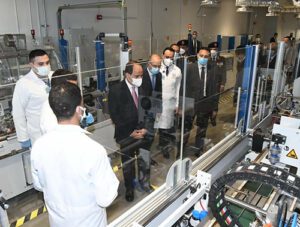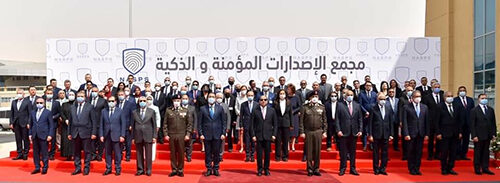Noticeable developments have been made in information and communication technology (ICT) over the past seven years, thanks to government efforts to build a digital Egypt and promote the ICT industry.
A report issued this month by the Ministry of Communications and Information Technology shows that ICT contribution to Egypt’s GDP increased to 4.4 per cent in the fiscal year (FY) 2019/20, while digital exports grew to $4.1 billion. ICT has been the fastest growing sector for two consecutive years as its growth rate is expected to reach 16 per cent during FY2020/21.
Digitisation
Egypt is currently paying special attention to digital transformation with an ambitious project to digitise all government services nationwide. It has allocated LE12.7 billion ($797 million) for gradual digital transformation in the FY2020/21 budget, Finance Minister Mohamed Maeet said.
The aim of the project is to digitise government services and make them available through multiple outlets suitable for the public. These outlets include the Digital Egypt platform, post offices, government service centres and the 15999 call centre.
So far, about 60 digitised government services have been launched on the Digital Egypt platform and 75 databases in different state sectors have been linked to the state’s integrated database project.
Digital Egypt will improve the skills of human resources to provide Egyptians with quality digitised services.
This is in addition to the first specialised ICT university in Africa and the Middle East, the ICT University will be known as the City of Knowledge with its campus in the New Administrative Capital.

Promoting local electronics
Three electronics innovation complexes have been opened in the Smart Village, the Technology Zone in Borg el-Arab, and the Technology Zone in Assiout as centres for development, creativity and digital manufacture of electronic applications and products. They are also set to stimulate start-ups and develop qualified staff in advanced electronics.
A contract has also been signed with Samsung to manufacture educational tablets in a new factory in Beni Sueif. Some $30 million has been invested in the project, and the factory, which will be completed in March 2022, will create 500 jobs. The contract also covers the training of 1,000 technicians in the latest technologies.
Assistive technology and inclusion
As part of the presidential initiative for the empowerment of people with special needs, a technical centre to serve disabled persons has been established. It enables people with hearing or speech related disability to use technology to communicate through mobile phones. An initiative has also been launched to grant the disabled access to services and information on government websites.
This is in addition to the establishment of the National Academy of Information Technology for People with Disabilities, which will serve as a regional centre for training and rehabilitation of people with special needs in the Arab World and Africa.
Post office development
The role of Egypt Post was reformulated, providing outlets for vital services. Some 1,600 post offices out of a total 4,000 were developed with 750 ATMs installed. There are also plans for another 500 new offices as well as refurbish 1,500 offices and install 1,000 ATMs.
Egypt Post has mobile booths that work at peak times, notably when customers draw their pensions.
Egypt Post has also become an outlet for Digital Egypt and financial inclusion services.
Artificial intelligence strategy
Egypt has established the National Council for Artificial Intelligence to supervise the application of AI in order to broaden the use of IT applications in agriculture, water management, health, planning, culture, antiquities, industry and infrastructure.
The Applied Innovation Centre has also been created to oversee such activities as machine translation and irrigation.

Digital training schemes
Numerous training initiatives have been launched in recent years under the auspices of the Ministry of
Communications and Information Technology.
‘Our Opportunity is a Digital’ initiative aims for a partnership between the government and private sector to develop small and medium enterprises.
“Future Work is Digital’ (FWD) will develop the skills of 100,000 Egyptians through Udacity’s online platform in three technological specialisations – web, data and digital marketing.
Qodwa.Tech initiative will contribute to the social and economic empowerment of girls and women nationwide.
“Work From Home” trains young people for freelance and remote-working for extra income in partnership with several freelance work platforms.






Discussion about this post